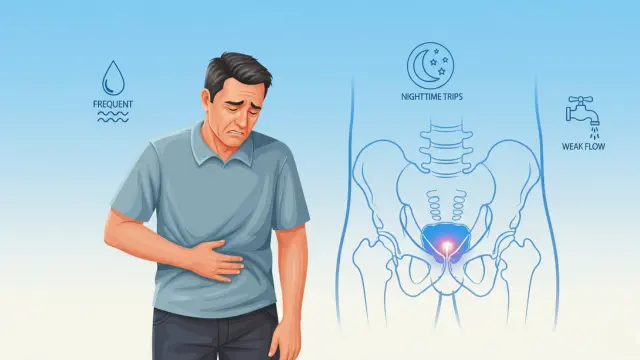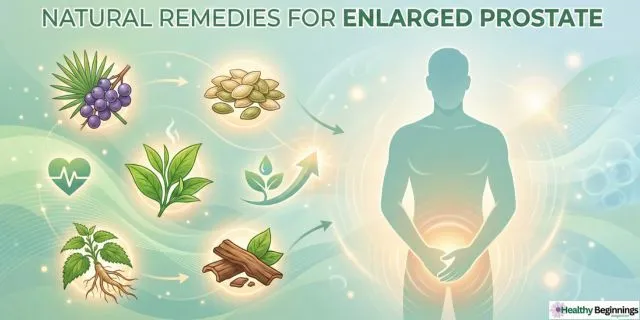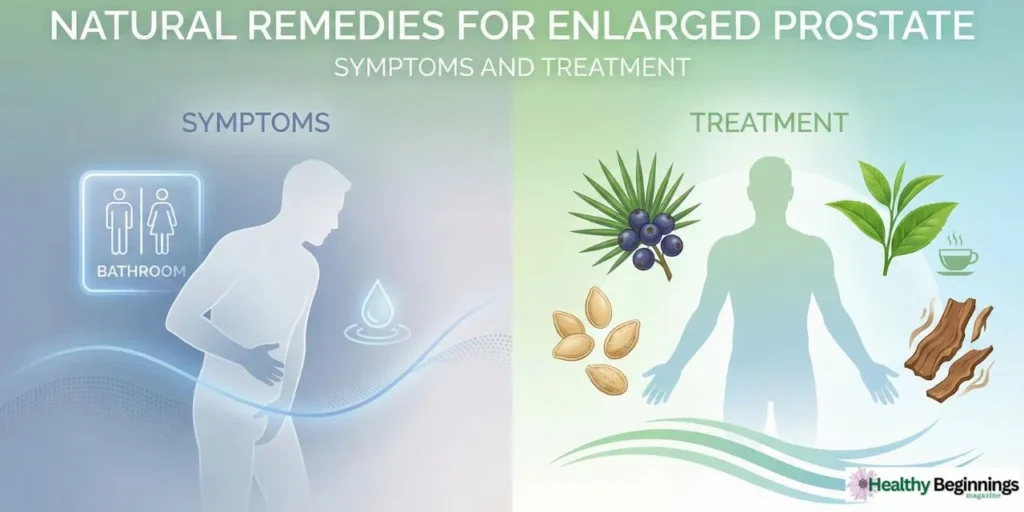Natural remedies for enlarged prostate are a hot topic for men who want to stop frequent urination, weak stream, and sleep disruption. An enlarged prostate, also known as benign prostatic hyperplasia, affects a lot of men as they age. The gland grows, the pipe narrows, and life becomes difficult. Many men look for natural options before medication or surgery, but most don’t know which ones have science and which ones are hype. This guide clears that up.
You will learn what triggers prostate growth, what symptoms matter, and which lifestyle habits have the most research backing. You will also see the truth about herbal supplements. Some show mild benefits in trials. Others show no change. Product quality varies. Expectations matter. This article keeps it real and gives you a simple roadmap.
Note: Focus on lifestyle changes first because they are the safest and most consistent. Some herbs can help a little, but results vary widely. And a medical review is necessary to rule out underlying issues and to guide safe use of any supplement.
What Is the Prostate and Why Does It Grow?
The prostate is a small gland that sits below the bladder. It surrounds the urethra, the tube that carries urine out of the body. Its job is to produce fluid that protects and supports sperm. In a healthy state, the prostate is about the size of a walnut. With age, it grows. This growth is slow but steady and can squeeze the urethra. That pressure causes problems with urination.
Several things drive this growth. The biggest is the hormone change. As men age, the balance of testosterone and other hormones shifts. The body converts more testosterone into a stronger form called dihydrotestosterone, or DHT. Higher DHT levels can stimulate more prostate cell growth.
Other biological changes also come into play:
This combination leads to benign prostatic hyperplasia, or BPH. The word benign means it’s not cancer.
BPH and prostate cancer are two different conditions. Both cause the gland to grow, but they behave differently. Cancer is uncontrolled cell growth that can spread. BPH is controlled, but excessive growth that stays inside the gland. Men should still get checked because symptoms can look similar. Early testing helps doctors catch serious problems before they become serious.
Now that you know how the prostate grows, you can choose the right steps to manage symptoms and protect long-term health.
Symptoms Men Actually Notice
Men with an enlarged prostate notice changes in urination. These changes are called lower urinary tract symptoms. They creep up slowly but can disrupt your daily life.

Common symptoms include:
- Weak stream
- Intermittent flow that stops and starts
- Hesitation when trying to go
- Urgency that’s hard to control
- Frequent trips to the bathroom
- Waking up at night to pee, known as nocturia
- Feeling like you don’t empty your bladder fully
- In severe cases, urinary retention
Doctors use the IPSS score to assess the severity of these symptoms. It’s a simple checklist to track progress over time. These symptoms are significant because they can disrupt sleep, increase the risk of infection, and lead to a sudden blockage of the bladder.
Important: If urination becomes slow, frequent, or uncomfortable, the prostate is probably growing and needs to be seen. You must consult your doctor.
Causes and Risk Factors
An enlarged prostate is caused by a mix of factors that men can control and factors they can’t. The gland responds to age, hormones, and long-term lifestyle habits. Knowing these drivers helps men act early.

Some risk factors are non-modifiable:
- Age. Prostate growth starts after 40 and accelerates after 50.
- Genetics. Family history increases the chance of BPH. Studies show high heritability in many men.
- Ethnicity. Data shows higher rates in some groups and lower rates in others due to genetic and hormonal patterns.
Other factors are modifiable, and these are the big ones that drive symptoms:
- Obesity. Extra body fat increases inflammation and hormone shifts that can enlarge the prostate.1The impact of obesity towards prostate diseases, PubMed Central
- Metabolic syndrome. High blood sugar, high blood pressure, and abnormal cholesterol increase risk.
- Sedentary lifestyle. Low activity levels slow down metabolism and can worsen inflammation.
- Smoking. Smoking damages blood vessels and increases overall inflammation in the prostate.
- Poor diet. Diets high in processed foods, sugar, and unhealthy fats can fuel metabolic issues.
Men can lower their risk by targeting the modifiable factors. A healthy weight, regular exercise, and a balanced diet support prostate health. These don’t stop aging but can slow down symptom progression and improve long-term urinary function.
Medical Treatments
Doctors have several proven ways to control symptoms of an enlarged prostate. These target the blockage and help men urinate more easily.
Alpha blockers like tamsulosin relax the muscles around the prostate. This improves urine flow in days. Doctors often use them first when symptoms affect daily life.
5 alpha reductase inhibitors like finasteride and dutasteride shrink the prostate over time. They work slowly but can slow down long-term progression in men with bigger prostates.
PDE5 inhibitors help men who have BPH symptoms and erectile issues.2The Role of 5-Phosphodiesterase Inhibitors (PDE-5I) in Current Benign Prostatic Hyperplasia Treatment: A Narrative Review, https://doi.org/10.3390/medicina60111736. They relax smooth muscle and improve urinary flow.
When medication isn’t enough, doctors may recommend minimally invasive procedures. These open up the blocked urethra without major surgery. In severe cases, surgical treatments remove prostate tissue and give long-lasting relief.
Natural remedies can’t replace these treatments in men with strong symptoms, repeated infections, or urinary retention. Evidence shows supplements are mild at best. Severe disease needs proper medical care to avoid long-term damage.
10 Natural Remedies for Enlarged Prostate
Natural Remedies for Enlarged Prostate can ease mild prostate symptoms, but the truth is that results are highly varied – and that’s largely down to the quality of the product you choose. And then some supplements can offer a slight benefit, but nothing to write home about. Still, don’t count out the power of lifestyle changes – they’re still the foundation of any serious treatment

1)- Get Your Lifestyle on Track
Simple daily habits can do a lot to improve your urinary flow and reduce irritation – and that’s a good place to start:
- Lose a bit of weight if you need to; it can make a big difference.
- Get some regular aerobic exercise; it’s good for your health in general.
- Add some weight training to your routine to boost your overall fitness.
- Try to avoid fluids late in the day; it’ll help reduce those dreaded nighttime trips to the loo.
- Kick caffeine and booze into touch, or at least try to cut back.
- Use timed voiding to help you empty your bladder on time.
- And don’t forget to do your pelvic floor exercises, it’s a good way to keep things in order.
By making these simple changes, you can lower your overall inflammation and start to gain some control over your symptoms – and doctors recommend these lifestyle changes before anything else.
2)- Saw Palmetto
Results are mixed. Some extracts help flow. Larger reviews show little effect.
- Dose: 160 mg twice daily or 320 mg daily.
- Safety: Mild stomach issues. Rare liver concerns. Possible drug interactions.
3)- Pygeum Africanum
Offers modest improvements in nocturia and flow.
- Dose: 50 mg to 100 mg twice daily.
- Safety: Generally well tolerated.
4)- Pumpkin Seed and Pumpkin Seed Oil
Helps comfort and bladder function. Works best with diet changes.
- Dose: 320 mg to 1,000 mg daily.
- Safety: Very low risk.
6)- Beta Sitosterol
Improves urinary flow but does not shrink the prostate.
- Dose: 60 mg to 130 mg daily.
- Safety: Rare interactions with cholesterol drugs.
7)- Rye Pollen Extract
Helps frequency and urgency in small trials.
- Dose: 126 mg to 378 mg daily.
- Safety: Safe with consistent use.
8)- Nettle Root
Supports hormone balance and flow. Often used with saw palmetto.
- Dose: 300 mg to 500 mg twice daily.
- Safety: May affect blood sugar or pressure.
9)- Green Tea, Lycopene, and Antioxidants
Support cell health and reduce inflammation. Best when taken as whole foods like tomatoes, berries, and leafy greens.
10)- Omega-3, Zinc, and Micronutrients
Support general prostate health. Do not fix moderate or severe symptoms. Food sources are safer than high-dose supplements.
What the Science Says
Studies are always a bit tricky as they use different doses and types of extracts, so results vary wildly. Some people do see improvements, others don’t notice a thing – and that’s because of the varied quality of the products. So quality matters.
Lay off the supplements for now and try to get your lifestyle sorted first, then see if one works for you – try one for 8-12 weeks, and choose a brand that’s been third-party tested – and always let your doctor know what you’re up to.
How to Safely Try a Natural Approach
A natural approach can really shine when you’re working with a clear plan and haven’t got any underlying health issues hidden in the mix. Your goal should be to start seeing some reduction in symptoms without trying to pass off something serious as a minor problem or accidentally combining herbs with medications that could just make things worse.
First things first, book yourself in for a medical check-up. A doctor will do some tests to make sure you’re not dealing with an infection, narrowing of the urethra, or anything that’s starting to look like prostate cancer. This step is all about avoiding guesswork. Ask your doctor to give you a baseline IPSS score & a PSA test if you’re old enough or have a family history to warrant it. These numbers will be super useful for tracking actual progress later down the line.
Next, try to stick with some pretty simple changes for a good 3 months. Focus on:
- Losing any extra weight you’ve got
- Getting in some regular exercise & moving around a bit more
- Cutting down on the coffee & booze
- Reducing fluid intake in the evenings
- Training your bladder with some timed voiding
If your symptoms aren’t getting much worse after that, then it might be time to start looking at testing out prostate supplements one at a time. Choose a reputable brand that offers a standardized extract and write down exactly what you’re taking & how much. Try one thing at a time & keep an eye out for any unwanted side effects or changes in your flow for 3 months.
Plan a follow-up session with your doctor if you start to feel worse or if you’re not seeing the improvements you were hoping for. Repeat that IPSS score and have a good old chat about what you can do next.
Safety always has to be your top priority when it comes to natural supplements – they can interact with alpha blockers, blood pressure meds, hormone therapies, and blood thinners, so make sure you’re getting some medical oversight to avoid any problems & catch any major conditions before they become a major issue.
When to See a Doctor Immediately
Seek medical help right away if you notice any of the following:
- Inability to urinate
- Severe pelvic or lower abdominal pain
- Blood in the urine
- Fever with burning or urgent urination
- Rapidly worsening urinary symptoms
- Unexplained weight loss, bone pain, or other signs that could suggest prostate cancer
These symptoms can signal infection, blockage, or a serious underlying condition. Do not try to self-treat or rely on supplements in these situations. Quick medical care prevents long-term damage and protects overall health.
Conclusion
Lifestyle changes should be the first step for any man with mild prostate symptoms. Regular exercise, weight control, and smarter daily habits often give clear improvements. Some supplements may help a little, but the evidence is mixed, and results vary from person to person. They cannot replace proper medical care.
Always get a medical evaluation if symptoms appear for the first time or begin to worsen. This protects you from missing infections or more serious conditions. Follow prescribed treatments if your doctor recommends them, especially for moderate or severe disease. Natural remedies work best as support, not as a substitute.
FAQs
Does an enlarged prostate go away on its own?
No. The prostate usually keeps growing with age. Symptoms can improve with lifestyle changes and treatment.
Do natural remedies shrink the prostate?
Most do not shrink the gland. They mainly help ease symptoms like flow, urgency, and nighttime urination.
How long should I try a supplement before judging results?
Give it 8 to 12 weeks while tracking your IPSS score and symptoms.
Can BPH turn into prostate cancer?
No. BPH is not cancer. Both can exist at the same time, which is why screening is important.
Is saw palmetto effective?
Results are mixed. Some men feel better, but many high-quality studies show little difference from a placebo.
When should I choose medical treatment instead of natural remedies?
Choose medical care when symptoms affect daily life, worsen quickly, or cause infections or retention.
What foods support prostate health?
Tomatoes, berries, leafy greens, pumpkin seeds, and fatty fish help lower inflammation.
Does caffeine make symptoms worse?
Yes. Caffeine increases urgency and frequency in many men. Reducing intake often helps.
NOTE: This article is only for informational purposes and not a replacement for medical advice. Please consult a healthcare professional before trying any new lifestyle.
Scientific References
- 1The impact of obesity towards prostate diseases, PubMed Central
- 2The Role of 5-Phosphodiesterase Inhibitors (PDE-5I) in Current Benign Prostatic Hyperplasia Treatment: A Narrative Review, https://doi.org/10.3390/medicina60111736.


Recent Posts